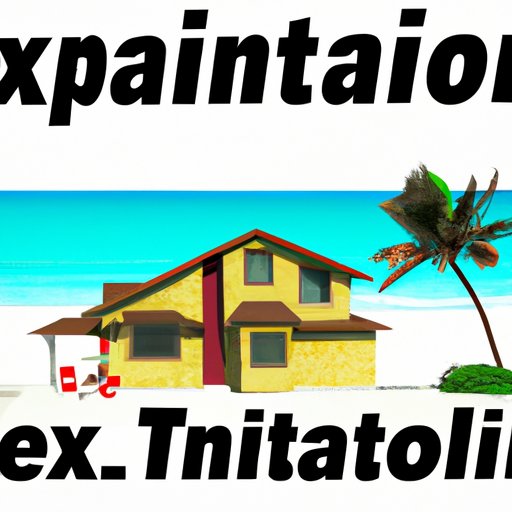Introduction
Vacation properties have become increasingly popular investments over the years. Investing in vacation property can be a profitable endeavor if done right, but it is important to understand the pros and cons before taking the plunge. In this article, we will explore different types of vacation properties available to invest in, tips on finding a good investment, financial benefits, and tax implications of owning a vacation property.
Different Types of Vacation Properties Available to Invest In
When it comes to investing in vacation properties, there are several types of properties to consider. Let’s take a look at some of the most common options:
Short-Term Rentals
Short-term rentals are one of the most popular types of vacation properties. These properties are usually rented out for a few days to a few weeks, and they can generate a steady stream of income. Short-term rentals may include cottages, cabins, apartments, or houses.
Long-Term Rentals
Long-term rentals are another popular option for vacation property investors. These properties are usually rented out for longer periods of time, such as a month or more. Long-term rentals may include condos, townhouses, or other multi-family dwellings.
Fixer-Uppers
Fixer-uppers are properties that need some work before they can be rented or sold. These properties are often purchased at a lower price due to the amount of work required. Fixer-uppers can be a great way to get into the vacation property market without breaking the bank.
Vacation Homes
Vacation homes are properties that are used solely for personal use. These properties are generally located in desirable locations and may include beachfront homes, ski chalets, or mountain cabins. Vacation homes are often purchased with the intention of renting them out when not in use.

Tips on Finding a Good Vacation Property Investment
Finding the right vacation property investment requires research and careful consideration. Here are some tips to help you find a good investment:
Research the Local Market
It’s important to do your research before investing in a vacation property. Research the local market to determine the type of property that would be most profitable. Look into rental rates, occupancy rates, and other factors that could affect the profitability of the property.
Consider Maintenance Costs
Maintenance costs can quickly add up, so it’s important to factor these costs into your decision. Consider the cost of repairs, cleaning, and other maintenance expenses that may be necessary. This will help you determine if the property is a good investment.
Analyze Rental Demand
The demand for vacation rentals can fluctuate depending on the season. Analyzing rental demand can help you decide which type of property would be most profitable. Research the area to determine the peak times for rental demand and plan accordingly.

Financial Benefits of Investing in Vacation Property
There are several financial benefits to investing in vacation property. Let’s take a look at some of the most common ones:
Cash Flow from Rental Income
The most obvious financial benefit of investing in vacation property is the potential for cash flow from rental income. Depending on the type of property you invest in, you can generate a steady stream of income from renting out the property.
Appreciation of Property Value
Another financial benefit of investing in vacation property is the potential for appreciation of property value. As the market fluctuates, the value of the property can increase, resulting in a nice return on investment.

Tax Implications of Owning a Vacation Property
Owning a vacation property comes with certain tax implications that should be taken into consideration. Let’s take a look at some of the most common ones:
Deductible Expenses
Certain expenses associated with owning a vacation property are deductible, including mortgage interest, insurance, and property taxes. It’s important to keep track of these expenses and consult with a tax professional to ensure that you are taking advantage of all available deductions.
Capital Gains Tax
If you sell the property for a profit, you may be subject to capital gains tax. Capital gains tax applies to the sale of any investment property, so it’s important to be aware of this before making the decision to sell.
Conclusion
Investing in vacation property can be a profitable endeavor if done correctly. There are several types of properties available to invest in, and it’s important to do your research to find the right one for you. Consider the financial benefits and tax implications before investing in a vacation property. With the right research and planning, investing in vacation property can be a rewarding experience.
(Note: Is this article not meeting your expectations? Do you have knowledge or insights to share? Unlock new opportunities and expand your reach by joining our authors team. Click Registration to join us and share your expertise with our readers.)
